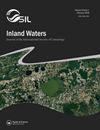气候变化和人类活动对西南高原湖泊有机氮埋藏时空变化的协同影响
IF 2.3
3区 环境科学与生态学
Q1 LIMNOLOGY
引用次数: 0
摘要
摘要湖泊沉积物中有机氮(ON)的浓度和来源影响湖泊氮循环。然而,影响ON积累速率的因素尚不清楚。2014年7月,我们采集了滇池北部、东部和南部3个沉积物岩心(分别为DC-N、DC-E和DC-S),研究了本地源和外来源对滇池氮的影响。从1900年到2000年,ON和ONAR分别增加了2.4-5.1倍和2.6-4.8倍,特别是自20世纪80年代以来,藻华发生频率更高。ON在DC-S > DC-N > DC-E顺序递减,ONAR在DC-N > DC-S > DC-E顺序递减,说明ONAR受ON含量和沉积环境的影响。3个岩心中正构烷烃(n-C12 ~ n-C34)的总浓度在4719 ~ 61 960 ng g−1之间,其比例随垂直深度的变化而变化。DC-S区和DC-N区氮源主要为外源(土壤侵蚀和陆生植物)和原生(藻类和水生植物),DC-E区氮源主要为浮游和陆生混合。STIRPAT随机影响模型表明,气温和氮肥每增加1%,滇池流域ONAR分别增加23-33%和20-79%,特别是DC-S和DC-E。然而,城市土地面积每增加1%,ONAR就会减少2-11%,特别是在DC-N。研究表明,随着气候变暖、变湿,加之化学氮肥施用量的增加,滇池ONAR的时空变化可能会增加。关键词:藻华滇池人类活动烷烃有机氮stirpat模型致谢感谢Editage (www.editage.cn)英文编辑。我们也衷心感谢两位匿名审稿人和副主编Grant Douglas博士的建设性意见,他们提高了本文的可读性和科学性。披露声明作者未报告潜在的利益冲突。基金资助:国家自然科学基金项目(批准号:41971009、41503054、41971286、41773097)和南京师范大学青年拔尖人才资助。本文章由计算机程序翻译,如有差异,请以英文原文为准。
Synergistic impacts of climate change and human activities on spatiotemporal organic nitrogen burial variation in a plateau lake in southwest China
ABSTRACTThe concentration and sources of organic nitrogen (ON) in lake sediments affect lake nitrogen cycles. However, the factors influencing ON accumulation rate (ONAR) are unclear. We collected 3 sediment cores from northern, eastern, and southern Dianchi Lake (DC-N, DC-E, and DC-S, respectively) in July 2014, to study the effects of autochthonous and allochthonous sources of ON. The ON and ONAR increased 2.4–5.1 and 2.6–4.8 times, respectively, from 1900 to 2000, especially since the 1980s, when algal blooms have occurred more frequently. The ON decreased in the order DC-S > DC-N > DC-E, whereas the ONAR decreased in the order DC-N > DC-S > DC-E, suggesting that ONAR was influenced by ON content as well as the depositional environment. The total concentrations of n-alkanes (n-C12 to n-C34) ranged from 4719 to 61 960 ng g−1 in the 3 sediment cores, with proportions varying with vertical depth. The sources of ON were mainly allochthonous (soil erosion and terrestrial plants) and autochthonous (algal and aquatic plants) in DC-S and DC-N, respectively, and primarily mixed planktonic and terrestrial in DC-E. The stochastic impacts by regression on population, affluence, and technology (STIRPAT) model revealed that a 1% increase in air temperature and nitrogen fertilizer corresponded to an increase in ONAR by 23–33% and 20–79% in the Dianchi Lake basin, especially in DC-S and DC-E. However, a 1% increase in urban land area reduced ONAR by 2–11%, especially in DC-N. Our study suggests that the spatial and temporal ONAR in Dianchi Lake may increase in response to a warmer and wetter climate combined with increasing chemical nitrogen fertilizer application.KEYWORDS: algal bloomsDianchi Lakehuman activitiesn-alkanesorganic nitrogenSTIRPAT model AcknowledgementsWe thank Editage (www.editage.cn) for English language editing. We also sincerely thank the 2 anonymous reviewers and Associate Editor Dr. Grant Douglas for their constructive comments to improve the readability and scientific presentation of this manuscript.Disclosure statementNo potential conflict of interest was reported by the author(s).Additional informationFundingThis work was funded by the National Natural Science Foundation of China (Grant No. 41971009, 41503054, 41971286 and 41773097), and the Youth Top Talent funded by Nanjing Normal University.
求助全文
通过发布文献求助,成功后即可免费获取论文全文。
去求助
来源期刊

Inland Waters
LIMNOLOGY-MARINE & FRESHWATER BIOLOGY
CiteScore
6.10
自引率
9.70%
发文量
34
审稿时长
>12 weeks
期刊介绍:
Inland Waters is the peer-reviewed, scholarly outlet for original papers that advance science within the framework of the International Society of Limnology (SIL). The journal promotes understanding of inland aquatic ecosystems and their management. Subject matter parallels the content of SIL Congresses, and submissions based on presentations are encouraged.
All aspects of physical, chemical, and biological limnology are appropriate, as are papers on applied and regional limnology. The journal also aims to publish articles resulting from plenary lectures presented at SIL Congresses and occasional synthesis articles, as well as issues dedicated to a particular theme, specific water body, or aquatic ecosystem in a geographical area. Publication in the journal is not restricted to SIL members.
 求助内容:
求助内容: 应助结果提醒方式:
应助结果提醒方式:


